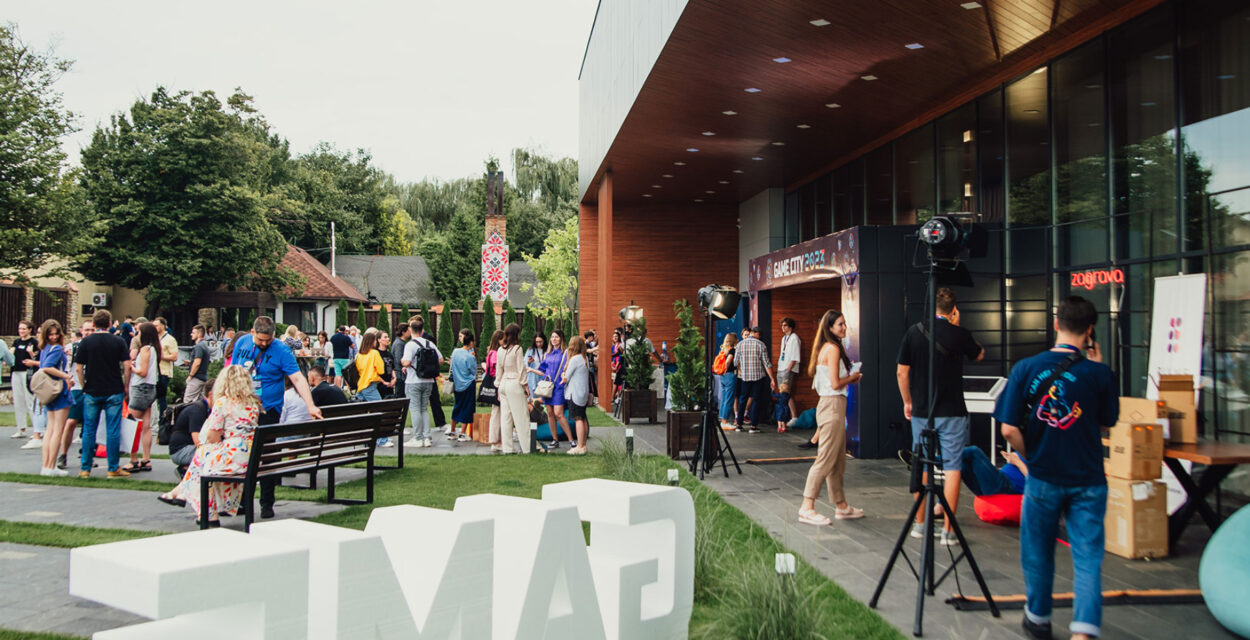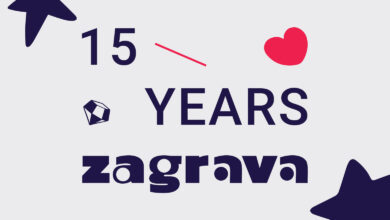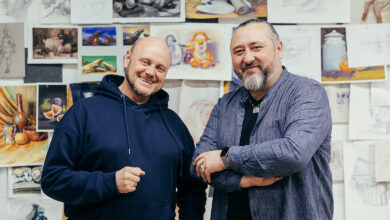Game City conference in Rivne: a bright debut that will start a tradition

Hello, everyone! I’m Eugenia Zhovnach, Administrative Director at Zagrava, and in this article I want to tell you about one summer weekend that changed the Rivne IT community forever.
The last few years have not been very rich in offline events in the Ukrainian gaming community – the pandemic and the war made us all think about safety first. In 2022, many of our colleagues were forced to leave their homes and cosy offices and took refuge in western Ukraine, where they were able to establish their lives and work. Rivne has also become one of the most popular locations for relocation, but despite all the positive impressions, people from big cities felt a strong contrast with the scale of professional communities in Kyiv or Kharkiv, for example. Although the city had hosted enough interesting events over the past few years, it was time to try something bigger.
A big idea in a small city
The idea to hold the conference was born during a meeting of the Rivne IT Cluster, an association of the largest IT companies in the Rivne region. It brings together representatives of almost all types of IT: fintech, gaming, product and service companies, equipment suppliers, etc. For most of us, regular volunteering has been added to the usual work-life balance, but despite all the challenges, the Ukrainian IT business supports the Ukrainian economy and continues to grow. Not everyone can afford to go to the nearest European gaming event, and interest in regular online seminars is declining. We asked our friends in the IT industry and they all unanimously agreed: they really miss live events.
That’s why, hesitating between online and hybrid conference formats, we opted for the latter, because we see how important it is for people to feel the drive of live communication with like-minded people.
With our idea, we applied to the USAID Competitive Economy of Ukraine program, which supports start-ups and small and medium-sized enterprises, helping them to increase their competitiveness in the domestic market of Ukraine and international markets. Having described the concept of the event in detail and highlighted the uniqueness of this event, we received a grant to implement our bold idea!
Armed with our experience of attending similar events, Zagrava game studio took over the organisation. Since 2019, Zagrava has been a part of the Irish company Playrix (despite the fact that Playrix was founded in Russia in 2004, it is now an international company with a clear pro-Ukrainian position, which has closed all offices and projects in Russia and Belarus and has been helping Ukraine a lot since the beginning of the full-scale invasion).
Zagrava has been on the market for over 13 years. Throughout our history, we have regularly joined charitable initiatives, and after 24.02.22, we only shifted our focus to accelerating our victory. In the first months of the full-scale invasion, we evacuated dozens of colleagues from Ukrainian studios from the hot spots, and to this day we close several meetings every month, deliver humanitarian aid and support IDPs.
We chose the name Game City for a reason, offering developers from all over the country to discover a city they hadn’t yet known. Many Ukrainians, and even residents of neighbouring regions, still perceive Rivne as a transit provincial town, and one of the goals of the conference was to show it for what it is: quiet, compact, safe, but modern and open to new perspectives. Few people know that the game dev movement in western Ukraine started in Rivne, and that thousands of IT professionals from all over the country work here, in the offices of IT companies and remotely. It was important for us to demonstrate to Ukrainian developers that normal living and working conditions are possible not only in megacities.
You can tell a lot, but it’s better to show once, so both the program and the dates of the event were chosen so that guests could see Rivne in its most vibrant period. The city always pays a lot of attention to the celebration of the City Day (the last Sunday of August), so immediately after networking and lectures, participants could switch to exploring the location, which annually offers a variety of leisure options for residents and visitors.
How it all went down
Future participants were offered a choice of 2 types of tickets:
Online: lectures, virtual stands, networking and Q&A (at a price of $9)
All Inclusive: access to online and offline parts, pre-party and main party, city and regional excursions, interesting seminars and networking (all included in the price of $49)
Traditionally for conferences of this type, Game City started online, offering both ticket holders 6 lectures on programming, game design, art and sound design. In addition, the audience was interested in the aspects of artificial intelligence that were shared by the speakers, allowing them to breathe a sigh of relief: AI will not replace artists, musicians, or programmers, but we need to learn to live side by side with it.
In the evening of 24 August, most participants from other cities had already arrived in Rivne for the offline part of the event. The main part of the conference, which we called MAIN DAY, was held in a country hotel and restaurant complex. The huge territory of the venue allowed us to avoid the crowds that are so common at conferences and to place all the most important points within one location: two lecture halls, where speeches and discussion panels were held in parallel, a coffee shop, a lounge area, meeting points, organisers’ stands, a buffet area, and a beer point.

An important criterion when choosing a location was the availability of a shelter that could accommodate all the invited guests. We would have been happy to host more people, but the safety of visitors came first, so more than 300 guests from Ukraine and abroad came to the Main Day of the conference. In our realities, we can sincerely say that we were lucky: the two air raids that day were after the end of the main lectures and did not last long.

What we talked about
The MAIN DAY program was divided into 4 blocks: In the morning, participants could choose between ART, featuring two art leaders from Zagrava and Smokoko – Serhii Demydiuk and Oleksandr Bodov, as well as one of the most prominent speakers of the event – Oleh Malamuzh, director of the Mavka cartoon; and EDUCATION, which was a discussion panel between Dmytro Doroshenko, head of the creative sectors of the economy division of the Department for Development of Innovative and Creative Sectors of the IP Office, Oleh Lahodniuk, deputy vice-rector of UCU for information systems and technologies, Serhii Veretyuk, head of the Noosphere engineering school network, and Mykhailo Boyko, head of the training programs at the FUGAS game studio.

A few years ago, with the assistance of Zagrava, the game development sector in Rivne began to develop actively in educational institutions, because despite the high demand for it, no Ukrainian school has yet graduated developers ready to work in game studios. Taking into account the expertise of companies with many years of experience and assessing the market situation, Rivne colleges, private institutions, and the National University of Water Management began to pay more and more attention to this particular educational area, so the discussion focused on the challenges for education in training this kind of specialist and the use of the game industry as a learning tool.

The DEVELOPMENT area was presented by Oleksiy Izvalov, Associate Professor of IT at Elworthy Institute of Economics and Technology and for many years the coordinator of the Ukrainian sector of Global Game Jam, the world’s largest game development hackathon. Oleksii told how every year more and more developers across the country join the Jam, and teams that once gathered for a few days of brainstorming turn into companies and bring their game prototypes to a marketable product. Every year, the Ukrainian GGJ has fixed hubs in several cities, and Rivne, based at the Zagrava office, has been on this list for 7 years in a row.

The development section also had a non-standard format: everyone could come to the meeting point to meet Zagrava CEO Oleksii Mykhasiuk or one of the studio’s project managers: Mykhailo Zhovnach, Maksym Parshin or Oleksandr Slepyi, to ask them any question about managing a large, branched team. There was really a lot to talk about: with more than 13 years of experience, the company has gone from a small studio with big challenges to a successful and stable corporation and has steadily survived the coronavirus crisis and full-scale invasion, continuing to work on future hits.
The real highlight of the conference was the participants of the BUSINESS section – a team of legal experts from the Diia.City Project Office led by Oleksandr Borniakov, Deputy Minister of Digital Transformation and Head of Diia.City. Together with Oleksiy Dobronravov and Dmytro Zinchenko, he spoke about the cooperation between the Ministry of Digital Transformation and the IT community, the functioning of Diia.City and the booking of IT specialists, and the discussion was supplemented by speeches by Yevheniia Zhovnach, Administrative Director of Zagrava, and Nadiya Hladkevych, CEO of RENOME, who shared their companies’ experience as Diia.City residents.

The BUSINESS panel also hosted another team of people who have gone from idea to implementation of their own project – three founders of successful startups, and Yana Paladieva, Head of Projects and Programmes at the Ukrainian Startup Fund. Oleksii Korzhenko from BigData holding ESM.ONE, Rev Miller from Atlantis World and its social metaverse, and Oleksii Bubnov from AR quest GuidAR – these three talented developers shared their expertise in their respective fields and the ups and downs on the way to release. The audience also received useful insights into budgeting for a successful game from Oleksandr Zalevsky, CEO of Smokoko games.

All these speeches and discussions inspire us to keep going, to work purposefully and develop, but we should not forget that working in the creative field and creating and generating creativity requires constant investment of energy and our own resources, which are easy to lose and important to restore. In order to help people to live their emotions in a balanced way, control stress and find new inner strength, Iryna Malamuzh, a psychologist and part-time screenwriter and producer, told the audience about self-healing methods and psychotherapeutic techniques for restoring their resources in her lecture “Creative & Resource”.

Such a selection of topics and lecturers allowed us to reach a wider audience than a regular highly specialised conference would have, because in addition to the “pure” game development itself, there are related areas that are closely intertwined with development both globally and in everyday details, so in one day, the participants were able to “walk” with the lecturers the entire path of becoming a specialist: from choosing an educational institution to enter after school “to become an IT specialist” to determining the form of employment and taxation in Diya. City.

Not just lectures
After the first offline day, the participants enjoyed a performance by the folk rock band OtVinta and a charity raffle where they could win a laptop from the conference’s technical sponsor for a donation of UAH 500 or more. In this way, almost 40 thousand hryvnias were raised in a short time to help children from Mariupol.
The next day, on Saturday, the conference participants could choose one of the following activities: a tour of Dubno Castle, a 15th-century monument, or a workshop on design thinking in gaming by Oleksandr Akimenko, co-founder of Yes&Design and Platform Media.
At the end of the activities, guests were invited to a tour of Zagrava’s office and a joint buffet to share feedback and impressions.

This event was a challenge for us, as we have never held an event of this scale before, but the result exceeded all expectations and justified all the efforts made. Now our first priority is to choose the dates for GCC 2024.


